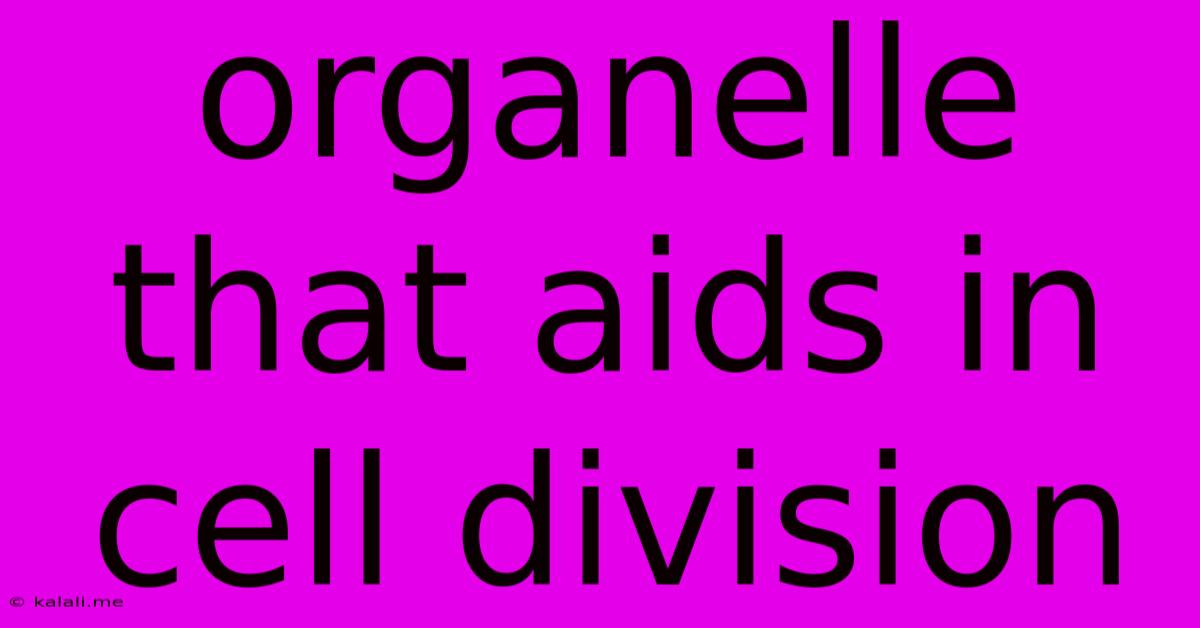Organelle That Aids In Cell Division
Kalali
Jun 16, 2025 · 3 min read

Table of Contents
The Unsung Hero of Cell Division: The Centrosome
Cell division, the fundamental process by which life perpetuates itself, is a marvel of orchestrated cellular mechanics. While the nucleus and its chromosomes rightfully take center stage in this drama, a less glamorous but equally crucial player quietly orchestrates the entire show: the centrosome. This remarkable organelle acts as the microtubule-organizing center (MTOC) and plays a pivotal role in cell division, ensuring accurate chromosome segregation and the formation of two healthy daughter cells. Understanding its function is key to grasping the complexities of cell reproduction.
What is a Centrosome?
The centrosome is a complex structure typically found near the nucleus of animal cells. It's not membrane-bound, unlike other organelles like mitochondria or the endoplasmic reticulum, but instead comprises two cylindrical structures called centrioles, surrounded by a dense, protein-rich matrix known as the pericentriolar material (PCM). The PCM is where the magic happens, acting as the primary site for microtubule nucleation and anchoring.
Centrosomes and Microtubules: A Dynamic Duo
Microtubules, the dynamic protein filaments forming part of the cell's cytoskeleton, are essential for cell division. During mitosis (cell division in somatic cells) and meiosis (cell division in germ cells), centrosomes duplicate and migrate to opposite poles of the cell. From these poles, they radiate microtubules, forming the mitotic spindle. This spindle apparatus is crucial for:
- Chromosome segregation: The spindle fibers attach to chromosomes via structures called kinetochores, effectively pulling the sister chromatids apart to ensure each daughter cell receives a complete set of chromosomes. Errors in this process can lead to aneuploidy, a condition associated with various diseases, including cancer.
- Cytokinesis: After chromosome segregation, the microtubules contribute to cytokinesis, the physical separation of the cytoplasm, leading to the formation of two independent daughter cells. The contractile ring, a structure composed of actin filaments and myosin, works in conjunction with the microtubules to ensure complete cell division.
Centrosome Duplication: A Precise Process
The accurate duplication of the centrosome is vital for proper cell division. This process is tightly regulated and intricately linked to the cell cycle. During the S phase (synthesis phase) of the cell cycle, the centrioles duplicate, creating two pairs of centrioles within a single centrosome. These then separate during mitosis, migrating to opposite poles of the cell, ensuring each daughter cell receives one centrosome. Dysregulation of centrosome duplication can lead to numerical centrosome abnormalities, contributing to genomic instability and potentially cancer development.
Centrosomes and Beyond: Research and Implications
Research on centrosomes is ongoing, with scientists exploring their role in various cellular processes beyond cell division. Their involvement in intracellular transport, cell polarity, and cilia formation is becoming increasingly clear. Understanding the intricacies of centrosome function is crucial not only for basic cell biology but also for developing therapeutic strategies targeting diseases associated with centrosome dysfunction. For instance, many cancers exhibit abnormal centrosome numbers and function, making centrosomes a potential target for cancer therapy.
In conclusion, the centrosome, although often overlooked, is a critical organelle that plays a fundamental role in cell division. Its ability to organize microtubules, facilitating chromosome segregation and cytokinesis, is essential for the accurate replication and transmission of genetic information. Further research into the intricate mechanisms of this unsung hero will undoubtedly unveil more about the fundamental processes of life itself and offer potential avenues for therapeutic interventions.
Latest Posts
Latest Posts
-
How To Create Clickable Image In Html
Jun 16, 2025
-
What Are The Factors Of 121
Jun 16, 2025
-
What Is A Theme Of The Passage
Jun 16, 2025
-
A Company That Provides Access To The Internet
Jun 16, 2025
-
Which Word Is Closest In Meaning To The Underlined Word
Jun 16, 2025
Related Post
Thank you for visiting our website which covers about Organelle That Aids In Cell Division . We hope the information provided has been useful to you. Feel free to contact us if you have any questions or need further assistance. See you next time and don't miss to bookmark.